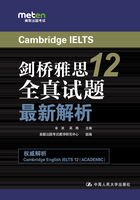
PART 3
Discussion Topics:
范例
Arriving early
Example questions:
1.E:In what kinds of situations should people always arrive in time?
C:Showing up on time for important business situations like the job interviews,meetings and so forth is an unspoken understanding.Also,picking up a friend from the airport or showing up for a house warming party on time is also a nice gesture in social settings.Because if we are late,it not only leads to losing our credit,but also can cause some irretrievable losses.
2.E:How important it is to arrive early in your country? Why?
C:Well,punctuality is a virtue.Being late is rude and tardiness will be considered disrespectful or even insulting to others.But interestingly,in my father´s generation in China,many took the impression that attending a meeting or ceremony late was a fashion,and turning up an hour later than advertised was not a big deal.But in the new era,people value efficiency more than ever and an increasing number of people,especially those in business settings,appreciate punctuality in a great deal.
3.E:What can modern technology help people to arrive early?
C:We can´t celebrate the convenience that modern technology brings us for our everyday travel too much.Take the subway as an example,it makes us stop worrying about the traffic jam especially during the peak time.No matter how far our destination is,the subway can always shift us to the place on time like clockwork.
Being patient
Example questions:
4.E:What kind of job require the most patience?
C:Teaching definitely requires patience.Because students tend to make a lot of mistakes,sometimes they even repeat the same mistakes multiple times.It is the responsibility of the teachers to correct them patiently.If a teacher is easy to become impatient,he or she will probably lose his or her temper easily in the class,and criticise even blame the students,which may impair students´ study motivation and learning enthusiasm.Other common positions include working as a home health aide,bus driver,childcare worker and social worker.These positions involve working with various groups of people,including the mentally ill,the elderly and children.A caring and patient personality would thrive in these positions.Plus,if being a parent is a job,it tops.
5.E:Is it always better to be patient in work (study)?
C:Certainly.As a matter of fact,there is no doubt that we have to be super patient towards tons of things in our life,especially when it come to the work.because no one can predict what kind of challenges or turbulences we will come across in our workplace.For instance,when there are some disagreements over some issues,we have to keep calm and negotiate with our co-workers patiently,otherwise it may result in more harm than good.
6.E:Do you agree or disagree that the older people are,the more patient they are?
C:Yes,I´m totally on the same page with that.Because when people get older,they usually become mentally mature.It is the various joys and hardships that they experienced that enables them become more patient.However,due to lacking of the rich life experience,young people tend to be easily impulsive.
翻译
1.E:在什么样的情况下人们应该守时?
C:在重要的商务场合上守时,比如面试和会议等,这能体现对别人的理解和尊重。此外,按时去机场接人或出席新居聚会不迟到也是种好的表现。因为迟到不仅使我们失去信用,同时有可能会导致无法挽回的损失。
2.E:在你的国家提前赴约有多重要?为什么?
C:守时是种美德。迟到或拖沓被视为对别人的不尊重甚至侮辱。有趣的是,在我爸爸那个年代,在会议或仪式上迟到反而很流行,晚到一个小时真不是什么大事。但是现在,人们很看重效率,尤其对商务人士来说守时特别重要。
3.E:高科技怎么样帮助人们提前到达目的地?
C:高科技给我们的生活出行所带来的便利不容小觑。拿地铁为例,地铁让我们不再为交通高峰拥堵而担忧。不管目的地多远,地铁总会让我们按时到达目的地。
4.E:你认为哪些工作最需要耐心?
C:教师绝对最需要耐心。学生往往会犯很多错误,甚至重复犯错。 而教师的责任正是耐心给学生纠正。如果一个老师不够耐心,他或她就很容易发脾气,批评甚至责备学生,这样往往会打压学生的学习动力和积极性。此外,其他常见的一些工作如家庭健康助理、公交车司机、育儿员和社会工作人员等,都会碰到各种各样的人包括精神病患者、老人和小孩,所以也需要耐心和爱心。另外,若家长也算一种工作的话,他们也要耐心。
5.E:在工作或学生中耐心很重要么?
C:当然很重要。毫无疑问,我们对生活上的很多事情必须要很有耐心,尤其是在工作中,因为在工作上没人能预知会遇到什么样的挑战和麻烦。如若发生了一些意见上的分歧,我们要冷静并耐心地和同事协商,否则会影响我们下一步的工作。
6.E:人越老越有耐心,你同意么?
C:我完全同意。因为年岁渐长,人们心智上会变得更加成熟。那些幸福和困苦的经历使得他们更有耐心。相比之下,年轻人由于缺乏生活阅历,往往容易冲动。
词汇
Part 1
grains
bean
calorie
prevent
wholesome
hydrate
relieve
symptom
adequate
occurrence
prevalence
infectious
flu
epidemic
measles
crucial
sufficient
well-being
[greInz]
[bi:n]
[´kæləri]
[prI´vent]
[´həʊls(ə)m]
[´haIdreIt]
[rI´li:v]
[´sImptəm]
[´ædIkwət]
[ə´kʌrəns]
[´prevələns]
[In´fekʃəs]
[flu:]
[.epI´demIk]
[´mi:z(ə)lz]
[´kru:ʃ(ə)l]
[sə´fIʃ(ə)nt]
n.
n.
n.
v.
adj.
v.
v.
n.
adj.
n.
n.
adj.
n.
adj.
n.
adj.
adj.
n.
谷物类
豆类
热量
预防
健康的
补水
减轻
症状
足够的
发生
流行
传热的
流感
流行的
麻疹
重要的
足够的
健康
Part 2
occasion
supervisor
appointment
recruit
approximately
urgent
candidate
anxious
facilitate
conference
tolerance
[ə´keIʒ(ə)n]
[´su:pə(r).vaIzə(r)]
[ə´pɔIntmənt]
[rI´kru:t]
[ə´prɒksImətli]
[´З:(r)dʒ(ə)nt]
[´kændi.deIt]
[´æŋkʃəs]
[fə´sIləteIt]
[´kɒnf(ə)rəns]
[´tɒlərəns]
n.
n.
n.
n.
adj
adj.
n.
adj.
v.
n.
n.
场合
主管
约会
招聘
大约
紧急的
应试者
焦急的
促进
会议
容忍
Part 3
house warming party
setting
virtue
credit
irretrievable
punctuality
tardiness
disrespectful
insulting
ceremony
value
efficiency
especially
celebrate
traffic jam
peak time
destination
clockwork
impatient
criticize
impair
position
health aide
childcare
involve
predict
negotiate
hardship
impulsive
[´setIŋ]
[´vЗ:(r)tʃu:]
[´kredIt]
[.IrI´tri:vəb(ə)l]
[.pʌŋktʃu ´æləti]
[´tα:dInəs]
[.dIsrI´spektfl]
[In´sʌltIŋ]
[´serəməni]
[´vælju:]
[I´fIʃ(ə)nsi]
[I´speʃ(ə)li]
[´selə.breIt]
[.destI´neIʃ(ə)n]
[´klɒk.wЗ:(r)k]
[Im´peIʃ(ə)nt]
[´krItIsaIz]
[Im´peə(r)]
[pə´zIʃ(ə)n]
[´tʃaIldkεə]
[In´vɒlv]
[prI´dIkt]
[nI´gəʊʃieIt]
[´hα:(r)dʃIp]
[Im´pʌlsIv]
n.
adj.
n.
adj.
n.
n.
adj.
adj.
n.
v.
n.
adv.
v.
n.
n.
adj.
v.
v.
n.
n
n.
v.
v.
v.
n.
adj.
新居聚会
环境,场合
美德
信用
不可挽回的
守时
拖拉
不尊重的
侮辱的
仪式
重视
效率
尤其是
庆祝,赞美
交通堵塞
高峰期
目的地
规律
不耐心
批评
损坏
职位
健康护理
儿童护理
涉及
预测
协商
困苦
冲动的